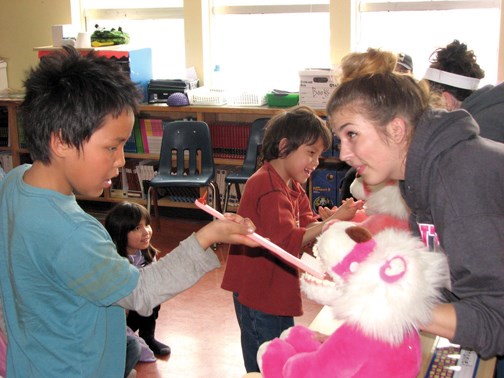KWADACHA -- Grade 3 student Theorron Massattoe doesn't always have dental floss handy when he goes to school, so he tends to improvise.
He just rips a thread off the bottom of his jeans. It does the trick just fine.
There was no shortage of floss after a group of 12 students from the College of New Caledonia's dental hygiene and dental assistant programs in Prince George visited Kwadacha (Fort Ware), 570 kilometres north of Prince George, and the nearby northern B.C. village of Tsay Keh last week as part of an outreach program. Each gift bag they handed out to the students contained a toothbrush, toothpaste, dental floss, and a mini hourglass to count down the two minutes they want each kid to spend brushing teeth.
"I know about flossing and about being healthy and that you shouldn't eat too much candy," said Massittoe.
For some of the kids, who have grown to associate dental care with pain after seeing adults in the village dealing with cavities and abscessed teeth, the CNC students showed them dental care can also be fun. Danielle Burton and Alexandria Amies spent time with the younger students at Aatse Davie school in Kwadacha and brought out large-mouthed stuffed animals equipped with oversized chompers to show the kids the proper way to brush and floss.
"It was funny, brushing the lion's teeth," said Grade 3 student Alyssa Seymour. "You have to brush your teeth night and day and after every meal. I only brush once a day."
"I always use floss," added Grade 4 student Pearl Sky McCook.
Kwadacha is one of the province's most remote First Nations villages. CNC's Mackenzie campus provides regular outreach programs through its aboriginal liaison worker to serve Kwadacha, population 320, and Tsay Keh (75 kilometres to the south ), which has about 200 residents.
CNC Mackenzie campus regional director Tanya Helton visited the area a year ago and noticed the dental rooms going unused in both communities. Dentists visit only every four to six weeks and priority is given to patients with urgent needs.
"Getting dental hygiene services for maintenance is very limited, so families who do need regular cleanings have to bring their kids or their entire families to Mackenzie or Prince George for services," said Helton.
"Driving is obviously a huge undertaking and hard to do on a regular basis. The health clinics noted it was hard it get the kids educated about hygiene and were seeing the need on a regular basis. They also noted in Tsay Keh, the number one reason for air medevac removals from the community was dental emergencies. It's a real health issue."
While some of the kids showed obvious signs of plaque buildup and tooth decay, the students showed a willingness to adopt better hygiene habits and take care of their own teeth. The younger students especially were excited about meeting the dental students and showed their appreciation by giving out hugs to the visitors.
A plate of fresh fruit brought by the CNC students was gobbled up quickly. Some of the kids, knowing fresh produce arrives only once a week in the local store, asked politely if they could take another banana.
Amies, 22, a second-year dental hygiene student, is nearing completion of her program and the one-day trip offered a unique opportunity to practice her dental skills in a rural setting while experiencing a slice of aboriginal culture unlike any she's ever seen.
"I've never been to such an isolated community before, and we're able to use what we've learned in school," said Amies. "The kids are great, so happy-go-lucky. They have to make their own games, they can't just go to the store to get the new bike. It's beautiful and they're outside, taking nature in."
For the 24-year-old Burton, now nearing the end of CNC's one-year dental assisting program, seeing the interactions of the students with their peers and with adults in the relaxed atmosphere of the isolated school was like going back in time.
"Everybody in the community is so interested in each other," said Burton.
"You can tell the kids have a real imagination, they're not texting on the phone, it's face-to-face, very community-oriented and it's refreshing to see that. Kids in the modern world don't know how to play and here they do that. They're outside, playing without iPhones and electronics and they're engaged and it's wonderful to see."
To make the trip possible, Northern Thunderbird Air donated a chartered flight for the 12 students, two instructors, two CNC staff members and two reporters.
The CNC visit has already led to at least one positive development. The Kwadacha school has implemented a new policy to have students brush their teeth in class three times during each school day.
For more stories on Clarke's visit to Kwadacha, see Monday and Tuesday's editions of The Citizen.



.jpg;w=120;h=80;mode=crop)